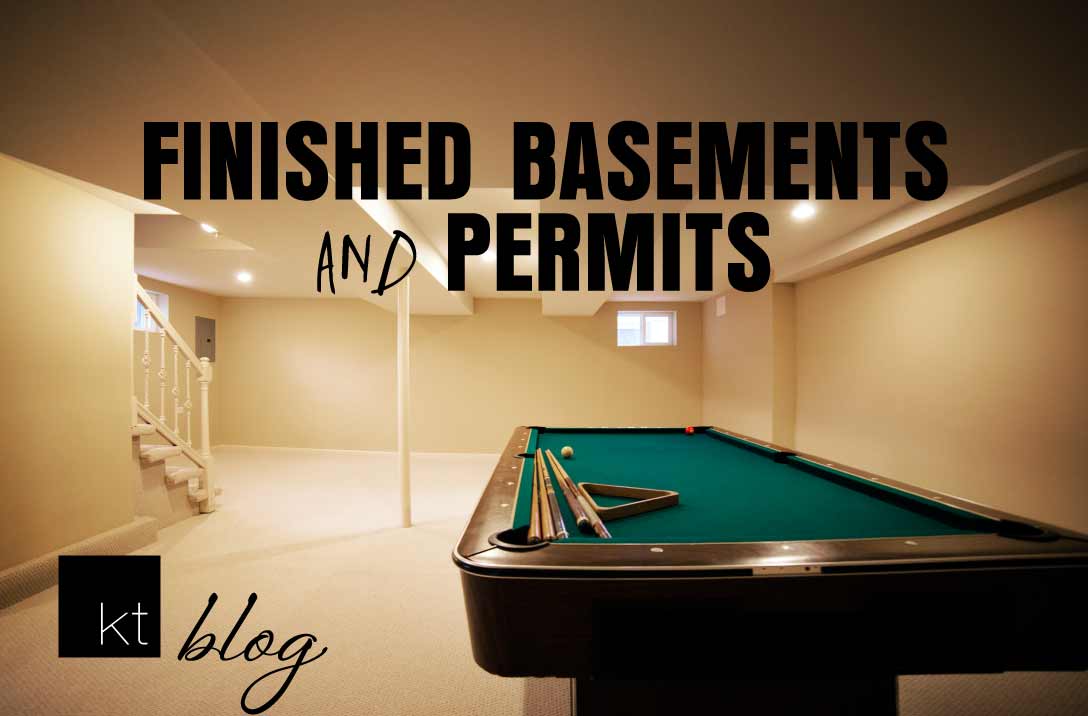The fall and winter are when people often decide to get renovations done, especially indoors. “Is it worth finishing my basement?” This question often arises when thinking about home improvements, and the answer is, YES!
Not only does a finished basement mean another level of versatile living space, but it also adds value and makes your home more desirable when it’s time to sell –if it’s done right.
A common dilemma is whether or not to get a permit for the reno. Read below to hear our thoughts as well as some insider tips to things to consider when it comes to finishing your basement.
Should You Get a Permit to Finish Your Basement?
Yes, it’s a good idea to get a permit. It ensures everything is done to code and adds value when reselling your home. There aren’t many costs associated with getting a permit, it ensures the renovations get done safely, and potential buyers could ask for it.
You absolutely need permits if you’re finishing your basement so you can rent it out. In fact, KT team will no longer represent landlords or tenants in the lease of a basement apartment that is not built to code and doesn’t have the required permits.
Click here to learn more about building permits in Ontario.
Basement Renovation Do’s
Basement Bathrooms
There are many factors to consider when finishing your basement, and one thing you don’t want to overlook is installing a bathroom.
Even if it’s not in your budget right now, make sure to get a bathroom rough-in, as it will increase the value of your home when it’s time to sell.
A bathroom is one of the first things buyers look for when in finished basements. It can be a huge selling feature, but if there isn’t one, or at least a provision to put one in, potential buyers can view it as having to spend time and money on renovations immediately after moving in. Even if the rest of the basement is nicely finished, no bathroom could mean no sale.
Subfloor
The subfloor is hidden beneath your finished floor, such as hardwood, laminate, or carpet. It serves as a solid structural base. It makes your floors a little warmer and it provides a protective have to channel to help redirect water, reducing the likelihood of water damage to your finished flooring.
Ceiling Insulation
Without insulation in the ceiling, you’ll hear every spoon drop in the kitchen above, the kids running, and the dog’s nails clicking. If you intend to have an office downstairs, a living area for guests or something else where a quieter space would be appreciated, insulation is a must. As an added level of noise reduction, consider using a furring channel too.
Go to 19:25 to find out what Ariel wishes he would have added to his basement design.
Storage Space
Don’t forget about storage. People often finish every square inch of their basement but neglect storage, something everyone needs. Whether it’s packing seasonal gear, filing away documents, or stocking up on essentials, there never seems to be enough places to put all our stuff.
Creating a designated storage spot in the basement will help keep everything organized. Functional open shelving is great for often-used items, while closets and cabinets can conceal less utilized articles.
Things To Run in the Basements Ceiling:
- Barbeque line outside
- Network cable
- Coaxial cable
- Frost-free hose bib for exterior shut-offs
Basement Renovation Don’ts:
- Don’t take shortcuts
- Don’t hire someone without seeing some of their past work
- Don’t hire someone based on photos posted on Instagram
Check out the top things to consider and most often forgotten basement upgrades here





